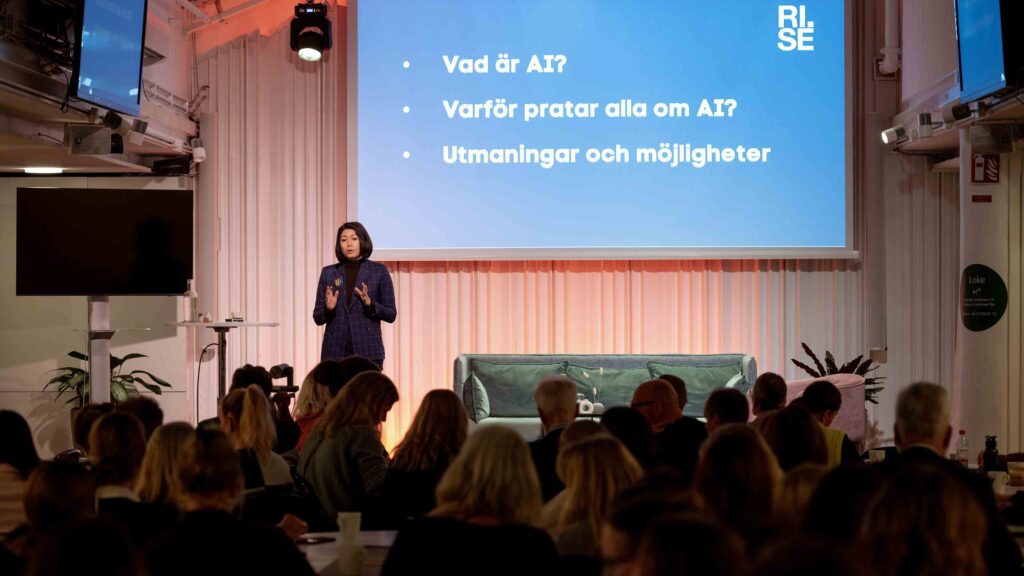What implications do advancements in AI have for professional science communicators? How are these tools currently used, and how might their usage evolve in the future? Plus, how can we, as a society, implement AI in a way that facilitates rather than hinders. These were among the many questions explored during the 2023 Forum for Science Communication, which took place on 28 November.

With over 200 participants physically present in Stockholm, and an additional 280 people joining online, the Forum for Science Communication delved into AI and the rapid technological developments of recent years. Throughout the day, discussion centred on the implications of AI advances for professional science communicators and its broader implications for society. On one hand, there were calls to experiment with the technology and embrace its possibilities, while on the other hand, there was an emphasis on the need for guidelines and regulations to ensure the safe and ethical implementation of AI. Participants also engaged in a hands-on workshop on how to use AI tools for knowledge acquisition, workflow efficiency and content creation.
Hanifeh Khayyeri, Head of Data Science at RISE Research Institutes of Sweden, encouraged participants to embrace AI in their professional roles to better understand its strengths and weaknesses.
”While many acknowledge that AI development brings numerous challenges, it also opens up new opportunities in various areas. Have a go at testing these tools within your organisations – that’s how you can identify strengths, weaknesses, and the optimal areas of application,” she recommended.
The risk of increased inequality
Professor Virginia Dignum from Umeå University also highlighted how current AI tools often rely on geographically and socio-demographically skewed data, primarily coming from a limited number of institutions in the global north. Dignum emphasised the importance of guidelines to ensure an inclusive approach to development and implementation.
Henrik Kugelberg, a researcher at the London School of Economics, also stressed the need for an equitable and fair implementation of AI technology. He argued that currently, we are moving in the opposite direction, with a small number of companies holding enormous power over AI technology. He also pointed out that discussions about hypothetical existential risks can divert attention from real issues at hand.
”The risk with all the talk about significant, future existential risks with AI is that we miss what is happening here and now – the power that the companies developing AI already have today,” noted Henrik Kugelberg.
AI is here to stay – engaging young people is crucial
Despite all the challenges, AI is here to stay. This was reiterated by Johanna Sandahl, Communications Director at Lund University, who talked about how her department had formed a special “task force” earlier in the spring to explore how AI tools might be implemented and used in their daily work. She emphasised that good communication professionals can only get better with good tools. ”The better we understand the fundamentals of the communication profession, the greater the use we can derive from AI tools,” she emphasised.
Lucella Bergström, coordinator of digital initiatives at Fryshuset youth centre in Stockholm, stressed the importance of involving the next generation in the development and implementation of AI technology. ”Young people are particularly worried about these advancements and it is affecting their outlook on the future. We need to respond to this and include them in the knowledge development,” she pointed out.
During the event, Natur & Kultur’s Popular Science Prize was awarded to Amat Levin for his groundbreaking educational project, Black history (Svart historia).
The conference was recorded and is possible to watch online, the films below are in English. The rest of the films (in Swedish) are available here.
Science communication with AI: How-to
Responsible AI: from principles to practice
The Forum for Research Communication (FFF) is an annual conference aimed at science communicators, researchers, journalists, and others active or interested in science communication. The conference is organised by Forte, the Knowledge Foundation, Knut and Alice Wallenberg Foundation, Ragnar Söderberg Foundation, Riksbankens Jubileumsfond, Natur & Kultur Foundation, the University Alliance Stockholm Trio, VA (Public & Science), the Swedish Research Council, and Vinnova.
Read more about the conference: https://forumforforskningskommunikation.se/about-the-forum-for-science-communication/
